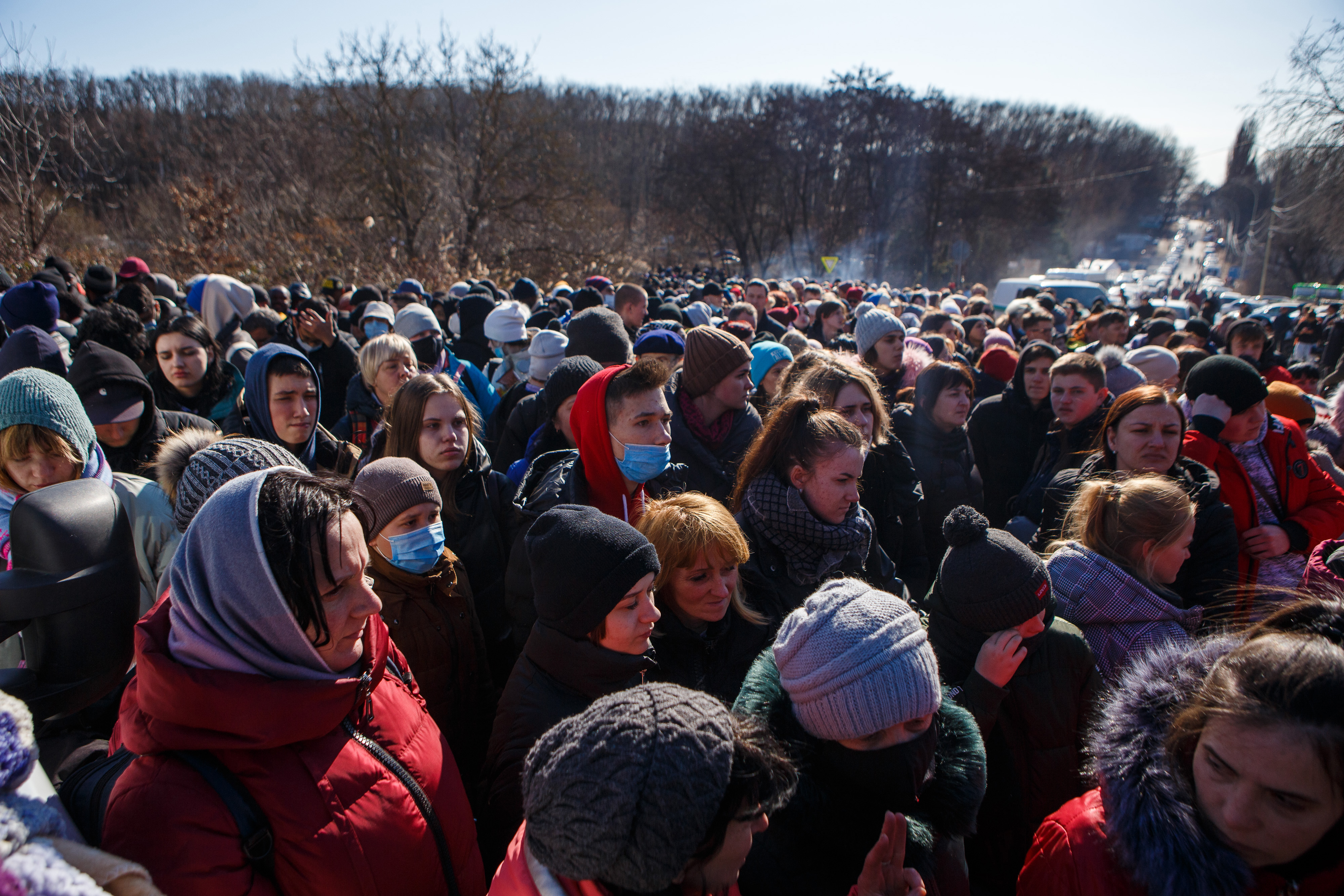What Britons think about resettling Ukrainian refugees in the UK
Pressure mounting on Home Office to accept more people fleeing Russian invasion

A free daily email with the biggest news stories of the day – and the best features from TheWeek.com
You are now subscribed
Your newsletter sign-up was successful
With reports suggesting that as many as 360,000 Ukrainians have been displaced by Russia’s invasion and up to four million more may still flee the country, pressure is mounting on the home secretary to do more to resettle refugees in the UK.
Currently visas are only being issued to the immediate family of British citizens who normally live in the UK. The policy is at odds with EU Schengen nations including Ireland, which have waived visa requirements to allow Ukrainians without paperwork to stay for three months.
But as the Home Office faces criticism for its muted response to the crisis, a survey has shown that the majority of the British public would back a government scheme to resettle Ukrainian refugees fleeing the Russian invasion.
The Week
Escape your echo chamber. Get the facts behind the news, plus analysis from multiple perspectives.

Sign up for The Week's Free Newsletters
From our morning news briefing to a weekly Good News Newsletter, get the best of The Week delivered directly to your inbox.
From our morning news briefing to a weekly Good News Newsletter, get the best of The Week delivered directly to your inbox.
Majority support UK resettlement scheme
A YouGov survey of nearly 2,000 British adults, carried out between 24 and 25 February, found that 63% would support the introduction of a resettlement scheme, with only 18% opposed to the idea (19% said they “didn’t know”).
Half of the respondents said that the UK has a moral obligation to offer asylum to Ukrainian refugees. This opinion differed widely depending on which political party the respondent had supported in the 2019 election: 73% of Lib Dem voters agreed that the UK has a moral obligation to offer asylum, compared with 67% of Labour voters and 38% of Conservative voters.
When specifically asked exactly how many Ukrainian refugees should be accepted into the UK, the most common answer, selected by 17% of the respondents, was “a few thousand”. The next most popular answer was “a few tens of thousands”, which was selected by 14% of the respondents. Almost 10% were willing to welcome “a few hundreds of thousands”.
Plans still being worked out
On Sunday night, Boris Johnson said in address at the Ukrainian Cathedral of the Holy Family in Mayfair, central London, that the UK would be “very generous” to Ukrainian refugees, but the precise details of Downing Street’s plans are still being worked through.
A free daily email with the biggest news stories of the day – and the best features from TheWeek.com
Labour’s shadow home secretary Yvette Cooper said it was “shameful” that the current visa rules do not apply to wider family members. “What are they thinking?” she tweeted. “What about people struggling to get elderly parents here, or Ukrainians who can’t come [and] stay with [their] sister or brother here?”
Scotland’s First Minister Nicola Sturgeon has called on the Home Office to lift visa requirements for all Ukrainians seeking entry to the UK, saying anything less would be “unacceptable”. Restricting visas to immediate family members is “too limited”, she tweeted.
The BBC understands from a Home Office source that the offer “will be extended to include relatives of people with indefinite leave to remain”, but this is yet to be confirmed.
-
 Political cartoons for February 16
Political cartoons for February 16Cartoons Monday’s political cartoons include President's Day, a valentine from the Epstein files, and more
-
 Regent Hong Kong: a tranquil haven with a prime waterfront spot
Regent Hong Kong: a tranquil haven with a prime waterfront spotThe Week Recommends The trendy hotel recently underwent an extensive two-year revamp
-
 The problem with diagnosing profound autism
The problem with diagnosing profound autismThe Explainer Experts are reconsidering the idea of autism as a spectrum, which could impact diagnoses and policy making for the condition
-
 Epstein files topple law CEO, roil UK government
Epstein files topple law CEO, roil UK governmentSpeed Read Peter Mandelson, Britain’s former ambassador to the US, is caught up in the scandal
-
 Iran and US prepare to meet after skirmishes
Iran and US prepare to meet after skirmishesSpeed Read The incident comes amid heightened tensions in the Middle East
-
 Israel retrieves final hostage’s body from Gaza
Israel retrieves final hostage’s body from GazaSpeed Read The 24-year-old police officer was killed during the initial Hamas attack
-
 China’s Xi targets top general in growing purge
China’s Xi targets top general in growing purgeSpeed Read Zhang Youxia is being investigated over ‘grave violations’ of the law
-
 Panama and Canada are negotiating over a crucial copper mine
Panama and Canada are negotiating over a crucial copper mineIn the Spotlight Panama is set to make a final decision on the mine this summer
-
 The rise of the spymaster: a ‘tectonic shift’ in Ukraine’s politics
The rise of the spymaster: a ‘tectonic shift’ in Ukraine’s politicsIn the Spotlight President Zelenskyy’s new chief of staff, former head of military intelligence Kyrylo Budanov, is widely viewed as a potential successor
-
 Why Greenland’s natural resources are nearly impossible to mine
Why Greenland’s natural resources are nearly impossible to mineThe Explainer The country’s natural landscape makes the task extremely difficult
-
 Iran cuts internet as protests escalate
Iran cuts internet as protests escalateSpeed Reada Government buildings across the country have been set on fire